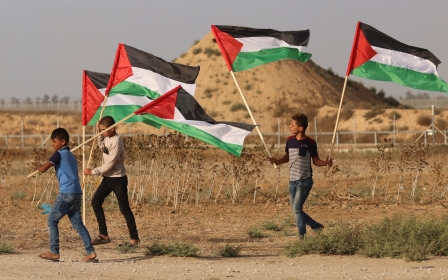Israel-Palestine war: 'We are fighting human animals', Israeli defence minister says

Israel's defence minister described Palestinians as "human animals" and vowed to "act accordingly," as fighter jets unleashed a massive bombing campaign on the Gaza Strip.
Yoav Gallant announced a "complete siege" of the Gaza Strip, an area of about 365 square km, and home to 2.3 million Palestinians, which has been under an Israeli-led blockade since 2007.
"I have ordered a complete siege on the Gaza Strip. There will be no electricity, no food, no fuel, everything is closed," Gallant said.
"We are fighting human animals and we are acting accordingly," he added.
The Israeli air force has dropped 2,000 munitions and more than 1,000 tonnes of bombs on Gaza in the last 20 hours, the army said on Monday morning, having shelled 20 high-rise residential buildings, mosques, hospitals, banks and other civilian infrastructure.
Stay informed with MEE's newsletters
Sign up to get the latest alerts, insights and analysis, starting with Turkey Unpacked
At least 500 Palestinians have been killed in the ongoing raids, including 91 children. Another 2,700 people have been wounded.
The bombardment comes as Palestinian armed groups continue to fight Israeli troops inside Israeli territory.
The surprise Palestinian attack, which started on Saturday, has left at least 700 Israelis killed and more than 2,000 wounded.
Follow Middle East Eye's live coverage for the latest on the Israel-Palestine war
Gaza was part of historic Palestine prior to the creation of the state of Israel in 1948. Some 750,000 Palestinians were expelled from historic Palestine in what is known as Al-Nakba, or "The Catastrophe".
More than 60 percent of Palestinians in Gaza are refugees, following the expulsion of families from other parts of Palestine in 1948.
Bordered by Israel and Egypt on the Mediterranean coast, the Gaza Strip is one of the most densely populated areas in the world.
Gaza was captured by Egypt during the 1948 Arab-Israeli War and was under Egyptian control until the 1967 Arab-Israeli War, when the territory was seized and occupied along with the West Bank and East Jerusalem.
In 2005, Israel purportedly pulled out of Gaza and relocated around 8,000 Jewish settlers and Israeli soldiers living in 21 settlements around Gaza to the occupied West Bank.
But in 2007, following the Hamas movement's election victory in Gaza, Israel responded by imposing an air, land and sea blockade of the Gaza Strip.
According to international law, the blockade amounts to an occupation of the strip.
Since 2008, Israel has launched four invasions of Gaza, in 2008, 2012, 2014 and 2021, which resulted in the deaths of thouands of Palestinians, mostly civilians and many children.
The campaigns resulted in the destruction of homes and offices, damage to pipelines and sewage treatment infrastructure, impacting drinking water and spiking waterborne diseases.
In the last major operation in 2021, at least 260 Palestinians were killed in Gaza while 13 people were killed in Israel.
Open-air prison
Israel's blockade systematically denies Palestinians access to services, hospitals, banks and other vital infrastructure, leaving the population to exist in fraught living conditions.
The blockade has also resulted in a perennial shortage of clean water, electricity, and medical supplies in what is often dubbed the world's largest open-air prison.
Roughly 97 percent of Gaza's drinking water is contaminated, and residents are forced to live with constant power outages due to a power grid that has been heavily damaged in repeated Israeli attacks.
Meanwhile, close to 60 percent of Palestinians live in poverty, and youth unemployment sits at 63 percent.
According to UNRWA, the UN agency that cares for Palestinian refugees, years of conflict and blockade have left 80 percent of Gaza's population dependent on international assistance.
Middle East Eye delivers independent and unrivalled coverage and analysis of the Middle East, North Africa and beyond. To learn more about republishing this content and the associated fees, please fill out this form. More about MEE can be found here.





